Treasury Secretary Yellen Heads to China July 6-9

Saudi Arabia to prolong unilateral oil production cut by one month
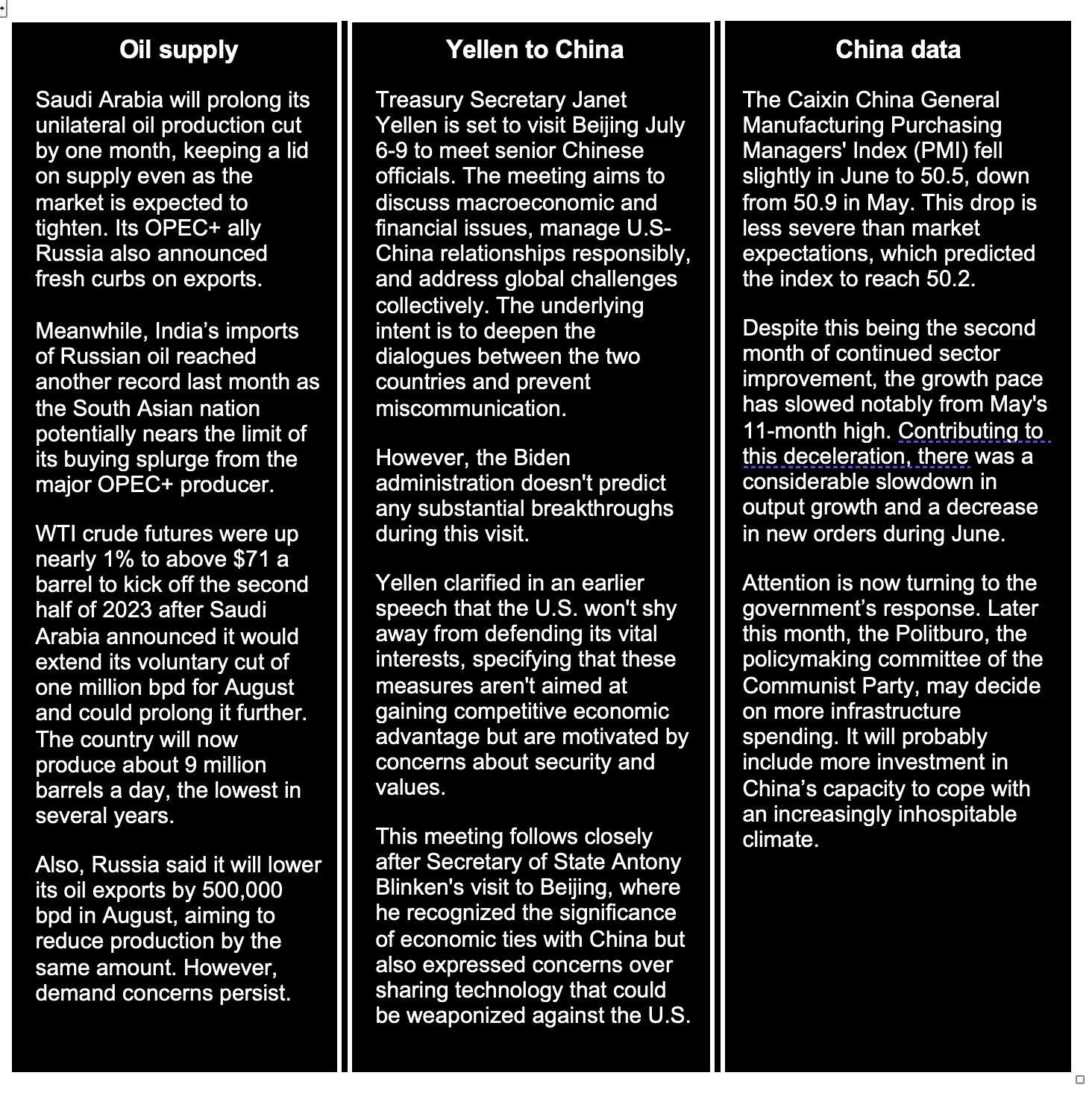
|
In Today’s Digital Newspaper |
Markets and government offices are open today. Markets and government offices will be closed Tuesday, July 4, for Independence Day. Grain and livestock markets will reopen at 8:30 a.m. CT on Wednesday, July 5. Have a happy and safe Fourth of July celebration.
Treasury Secretary Janet Yellen’s visit to the world’s second-largest economy this week is a sign for some that the U.S. and China want to improve relations. She’ll visit China from July 6-9, just three weeks after Secretary of State Anthony Blinken’s trip.
President Biden heads to Europe next week to firm up relations with key NATO allies. The July 9-13 trip includes talks with Rishi Sunak, a stop for the NATO summit, and a gathering with Nordic leaders.
Over the past week, an increase in delayed or canceled flights within the United States has created trouble for travelers gearing up for the Fourth of July. More than 42,000 flights arrived late and more than 7,900 were canceled from last Saturday through Friday. United Airlines was responsible for most of these cancellations. Despite the inconvenience to passengers, United's CEO, Scott Kirby, controversially opted to take a private jet out of the New York area. The CEO has issued an apology after this incident.
The Independence Day weekend is anticipated to set a new record for travel volume. Forecasts estimate that 4.17 million Americans will be flying to their destinations, an increase of 11.2% from 2022 and 6.6% from 2019.
The national average for a gallon of regular unleaded stood at $3.49 on Saturday, GasBuddy reported, about 30% below the record of $5.03 set in mid-June 2022, though still 35% higher than at the end of 2019.
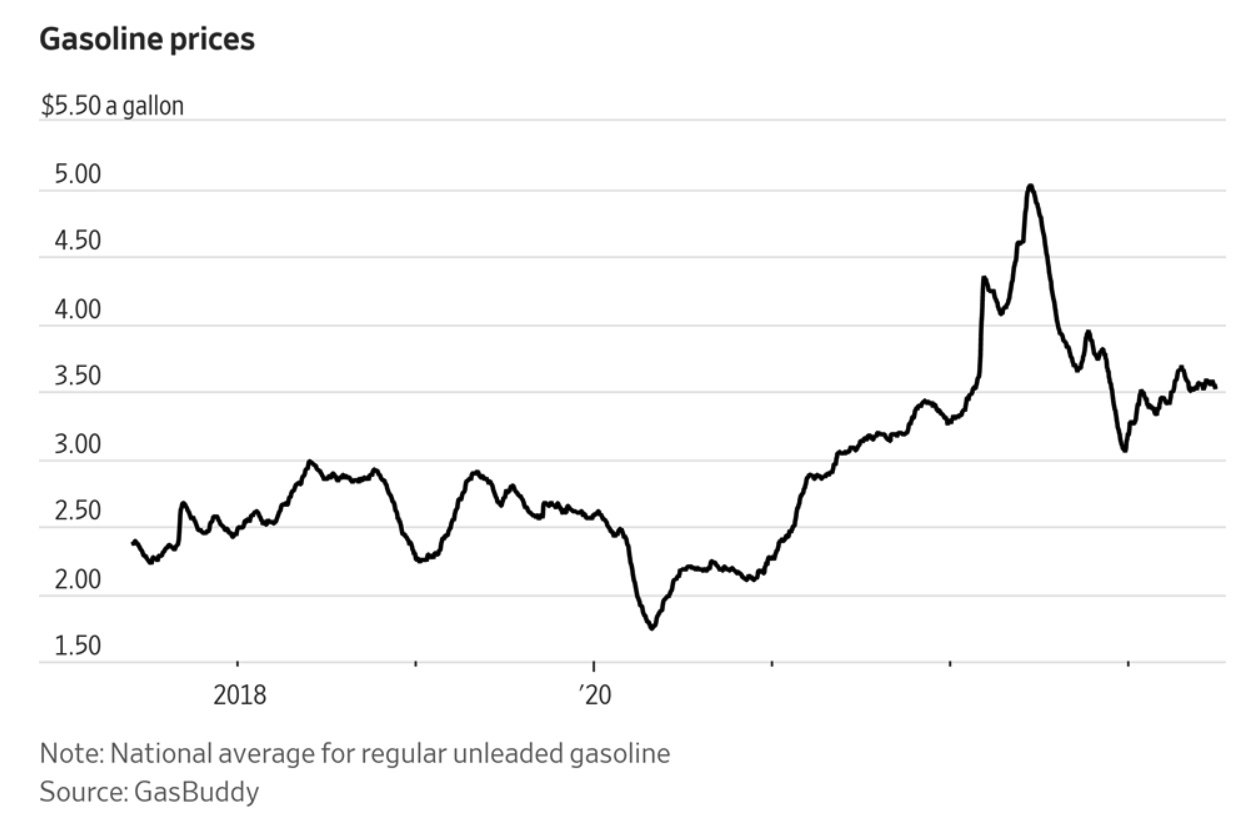
Factory activity in China slowed while manufacturing in the Eurozone and Germany contracted more than initially anticipated in June.
For the third straight year, Chinese companies are agreeing to buy more liquefied natural gas on a long-term basis than any single nation. Details in Markets section.
China's state planning agency has issued a warning regarding declining hog prices, stating that they have now fallen into a critical "warning zone.” See more in China section.
The number of ethanol plants that can use corn as a feedstock is rising in Brazil. Details of FarmDoc report in Markets section.
EU weighs concession to Russian bank over Black Sea grain deal. Details in Russia & Ukraine section.
U.S. Supreme Court agreed to hear a case challenging the Securities and Exchange Commission's (SEC) use of its in-house tribunals to enforce securities laws.
House Republican leaders face a significant challenge in trying to pass government spending bills as their party, particularly the hard-right factions, have a history of opposing federal spending. More in Congress section.
No Labels, a 13-year-old nonprofit organization, plans to push forward with its third-party candidate initiative despite historical data and polling suggesting such a candidate might inadvertently benefit former President Donald Trump. The WSJ reports that the organization, which is not compelled by law to identify its donors, is set to evaluate their political prospects after the Super Tuesday primaries. If they foresee a viable electoral route to victory, candidates will be announced in April. Despite facing likely challenges, No Labels, with a budget of $70 million, has already secured spots on the ballots in Arizona, Alaska, Colorado, Oregon, and Utah, and is seeking access to others.
Battle for control of the Senate has heated up, with five seats expected to be closely contested in the 2024 elections. More in Politics & Elections section.
|
MARKET FOCUS |
Equities today: Asian and European stock markets were mixed to higher in quieter overnight trading. U.S. Dow opened down around 70 points. In Asia, Japan +1.7%. Hong Kong +2.1%. China +1.3%. India +0.8%. In Europe, at midday, London +0.3%. Paris +0.2%. Frankfurt +0.1%.
U.S. equities Friday: All three major indices registered gains for the week, with the Dow up 2.2%, the Nasdaq rose 2.3% and the S&P 500 gained 2.5%. On Friday, the Dow ended up 285.18 points, 0.84%, at 34,407.60. The Nasdaq moved up 196.59 points, 1.45%, at 13,787.92. The S&P 500 rose 53.94 points, 1.23%, at 4,450.38.
Apple on Friday became the world’s first corporation to close with a market value above $3 trillion, a milestone that reflects the lasting impact and resilience of the iPhone.
Tesla deliveries surged in the second quarter. The company delivered 466,140 vehicles for the period, an 83% increase year over year. The total beat Wall Street's expectations. The spike follows the electric automaker's efforts to boost manufacturing capacity, and comes after it offered incentives to increase sales in the U.S.
Agriculture markets Friday:
- Corn: December corn futures gave up corrective overnight gains and fell 33 3/4 cents to $4.94 3/4, falling 93 1/4 cents on the week. Expiring July futures ended the session down 26 1/2 cents at $5.54 1/2, ending the week 74 1/4 cents lower.
- Soy complex: November soybeans surged 77 1/2 cents to $13.43 1/4, gaining 33 1/4 cents on the week and a whopping $1.96 3/4 on the month. August meal rose $17.00 to $413.90, for a $6.50 week-over-week gain, and $26.10 increase on the month. August soyoil rose the limit of 400 points to 61.70 cents, rising 370 points on the week and notching a solid monthly gain of 1,539 points.
- Wheat: December SRW wheat futures fell 15 1/4 cents to $6.69 ¼, finishing near the session low. For the week, December SRW lost 92 1/2 cents. December HRW wheat futures fell 1 1/4 cents to $8.00 1/4, near the session low. On the week, December HRW dropped 62 3/4 cents. Spring wheat futures fell 13 1/4 to $8.21 3/4, losing 58 cents on the week.
- Cotton: December cotton rose 134 points to 80.37 cents, gaining 170 points on the week and marking a 90-point monthly gain.
- Cattle: Stabilizing cash and wholesale prices, along with a seeming bullish response to corn breakdown, boosted cattle futures Friday. The nearby June contract went off the board at $181.50, up $1.75 at noon, while most-active August jumped $2.675 to $177.175; that’s up $6.40 on the week. August feeder futures rocketed $5.20 higher to $247.575, with the daily high of $247.825 representing a fresh all-time high for nearby feeder futures. The close marked a weekly jump of $13.625.
- Hogs: August lean hog futures rose 27 1/2 cents to $92.60, nearer the session high and for the week gained $2.925.
Ag markets today: Soybean futures aggressively extended Friday’s price rally during overnight trade, finishing the session 38 to 50-plus cents higher. Corn followed to the upside with gains of 4 cents in most contracts. Wheat traded mixed, with SRW around 3 cents lower, HRW 4 to 6 cents higher and HRS mostly 2 to 3 cents higher.
Market quotes of note:
- Friday's unsurprising PCE inflation "provides some support for the doves at the Fed," Capital Economics' Andrew Hunter says in a note. "There is little here to stop the Fed from hiking rates again at the late-July FOMC meeting but, with consumption growth and core inflation losing momentum, we still think that hike will prove to be the last." May's core annual PCE was 4.6%, vs April's 4.7% pace, while the headline figure slowed to 3.8% from 4.4%. One more rate increase followed by a long pause is the scenario with higher odds in the CME's FedWatch tool.
- Changing times. “Ten years from now, finance and accounting professionals will have a totally different set of skills than the experienced professional of today and will largely look more like data scientists and systems engineers.” — Mark D. McDonald, senior director at technology research and advisory firm Gartner.
- Farm supply costs. “This was the most expensive crop ever put into the ground by a U.S. producer.” — Matt Bennett, an Illinois farmer and co-founder of brokerage and consulting firm AgMarket.Net, on farm supply costs
- United CEO apologizes for flying private as airline cancels thousands of flights. "Taking a private jet was the wrong decision because it was insensitive to our customers who were waiting to get home. I sincerely apologize to our customers and our team members who have been working around-the-clock for several days —often through severe weather —to take care of our customers." — Scott Kirby, CEO, United Airlines.
- 2024 presidential election. “Americans want more choices rather than a repeat of the 2020 presidential race.” — Ben Chavis, a national co-chairman of No Labels.
Market perspectives:
• Outside markets: The U.S. dollar index was firmer, with the euro and British pound both weaker against the dollar. The yield on the 10-year U.S. Treasury note was slightly higher, trading around 3.85%, while global government bond yields were mostly higher. Crude oil futures were higher as U.S. trading neared, with U.S. crude around $71.40 per barrel and Brent around $76.05 per barrel. Gold and silver were weaker, with gold around $1,920 per troy ounce and silver around $22.99 per troy ounce.
• For the third straight year, Chinese companies are agreeing to buy more liquefied natural gas on a long-term basis than any single nation. Importers are consistently signing some of the industry’s longest and largest contracts, and the government is happy if they ink more, Bloomberg reports (link). These deals lock in LNG through the middle of the century to help avoid energy shortages — like the ones the country faced in recent years due to coal and hydropower supply crunches. At the same time, the push expands China’s control over global gas supply.
Upshot, according to Bloomberg: China can provide stability during periods of global shortages, but it could withhold supply and drive up prices if needs at home must be met. Either way, the nation will be shaping the future of the industry for decades to come.
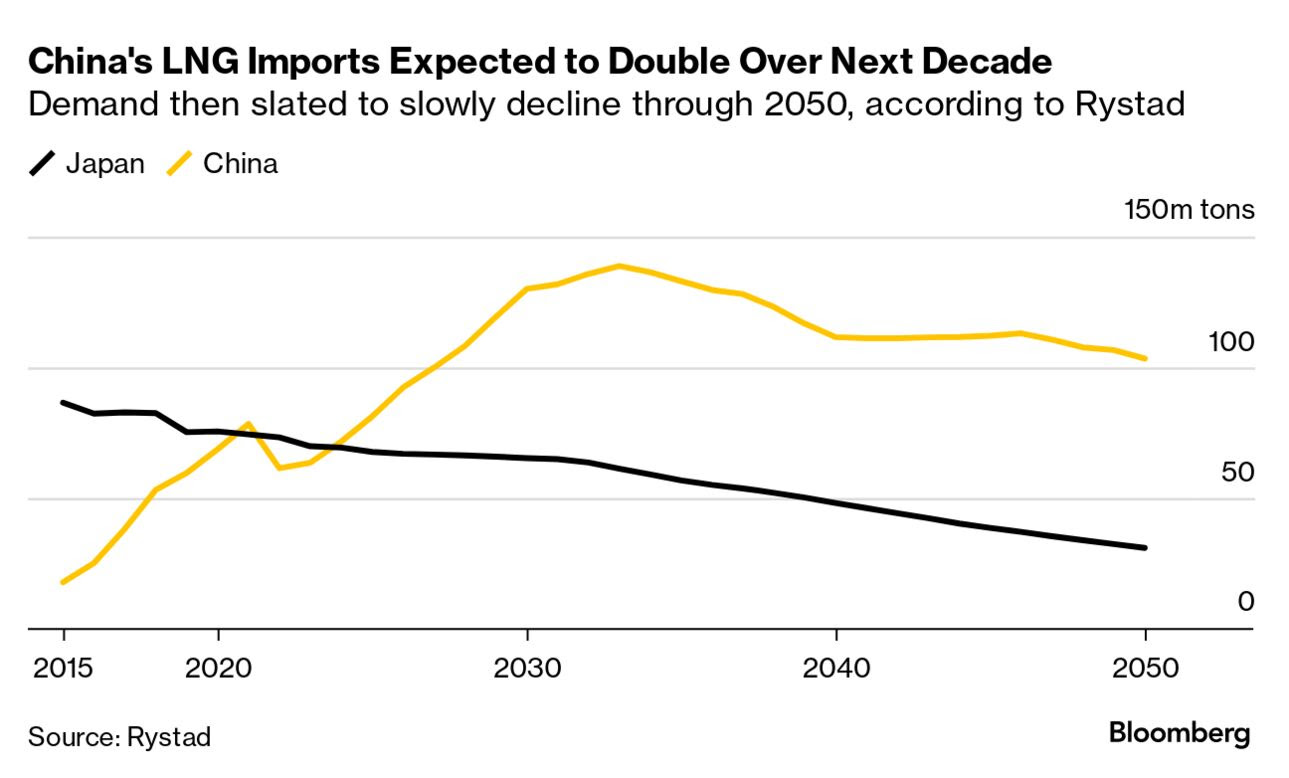
• The oil market has conveyed a warning to Saudi Arabia and other stakeholders banking on a rebound in oil prices, according to a Wall Street Journal article (link). Saudi Arabia, one of the world's biggest oil producers, reduced its oil output in the hope that demand will outweigh production later this year, prompting a rally to restore significant profits to oil producers. However, a key market indicator implies that oil supplies won't decrease for months.
This indicator, called contango, reflects an oversupply of oil when the present price for oil contracts falls compared to future ones. These market signals indicate a disconnect with projections made by Saudi officials, the International Energy Agency, and major banks, who expect demand to pick up during the latter half of the year.
Complicating the situation is the international economic downturn, with signs of weakening growth in China and Europe, particularly Germany. The World Bank predicts slower global economic growth due to high inflation and increasing interest rates, expanding only 2.1% this year, down from 3.1%. This is resulting in lower demand for oil.
Brent-crude prices dropped 13% to about $75 a barrel as of the first half of the year, despite output cuts by the OPEC+ cartel led by Riyadh. This resulted in lower gas prices for American consumers. However, fuel consumption is also declining in China and Europe, hinting at decreased demand.
Saudi Aramco, Saudi Arabia's state oil giant, benefits from the higher prices for high-sulfur crude oil, but these tactics have failed to stimulate the broader market. This situation forces the corporation to face the weaker North Sea market.
Moreover, the current contango in Brent may dissuade investment in oil derivatives. There are some potential boosts for oil prices, such as increased fuel consumption by U.S. consumers and alterations to how Brent prices are calculated. However, these may not be enough to counter other negative market forces, including high interest rates, increased Iranian oil exports, and declining petrochemical output.
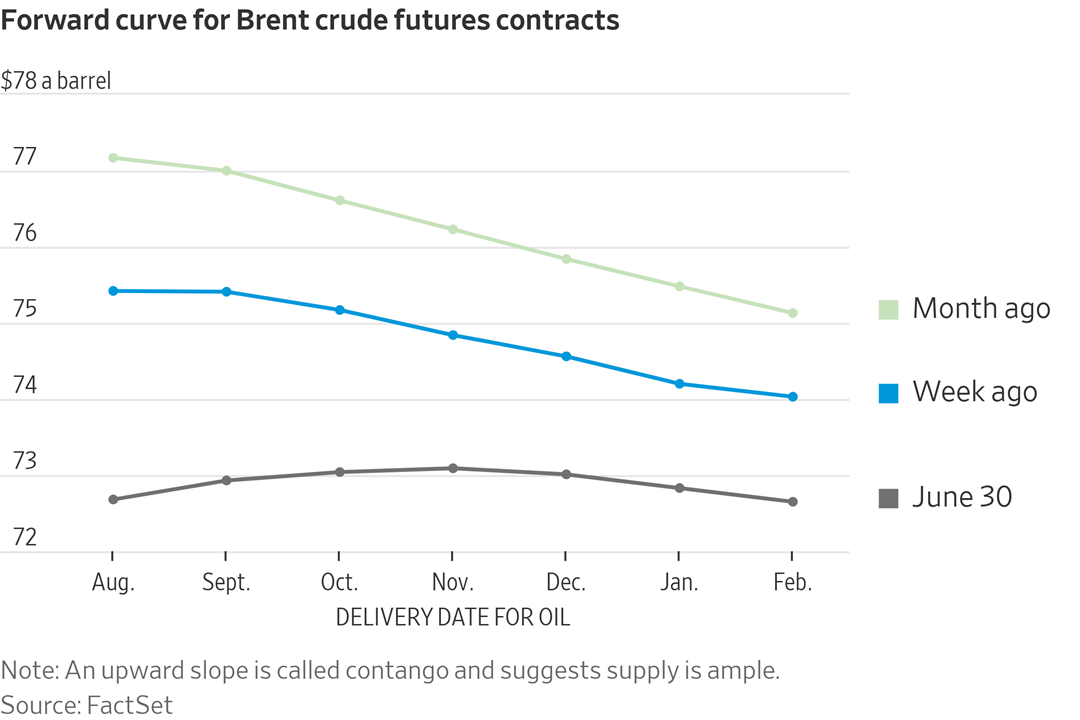
• The number of ethanol plants that can use corn as a feedstock is rising in Brazil, predominantly in Center-West states such as Mato Grosso, Mato Grosso do Sul, and Goiás, according to a FarmDoc report (link). This growth is driven by the consistent increase in second crop corn production and logistical challenges that incentivize the use of corn locally. Although corn offers some benefits compared to the traditional sugarcane feedstock for ethanol production, it also poses certain challenges. Nevertheless, trends indicate that corn-based ethanol industry will continue to expand in the future. Currently, corn-based ethanol is nearing a significant milestone4, as it's expected to make up nearly 20% of Brazil's total ethanol production.
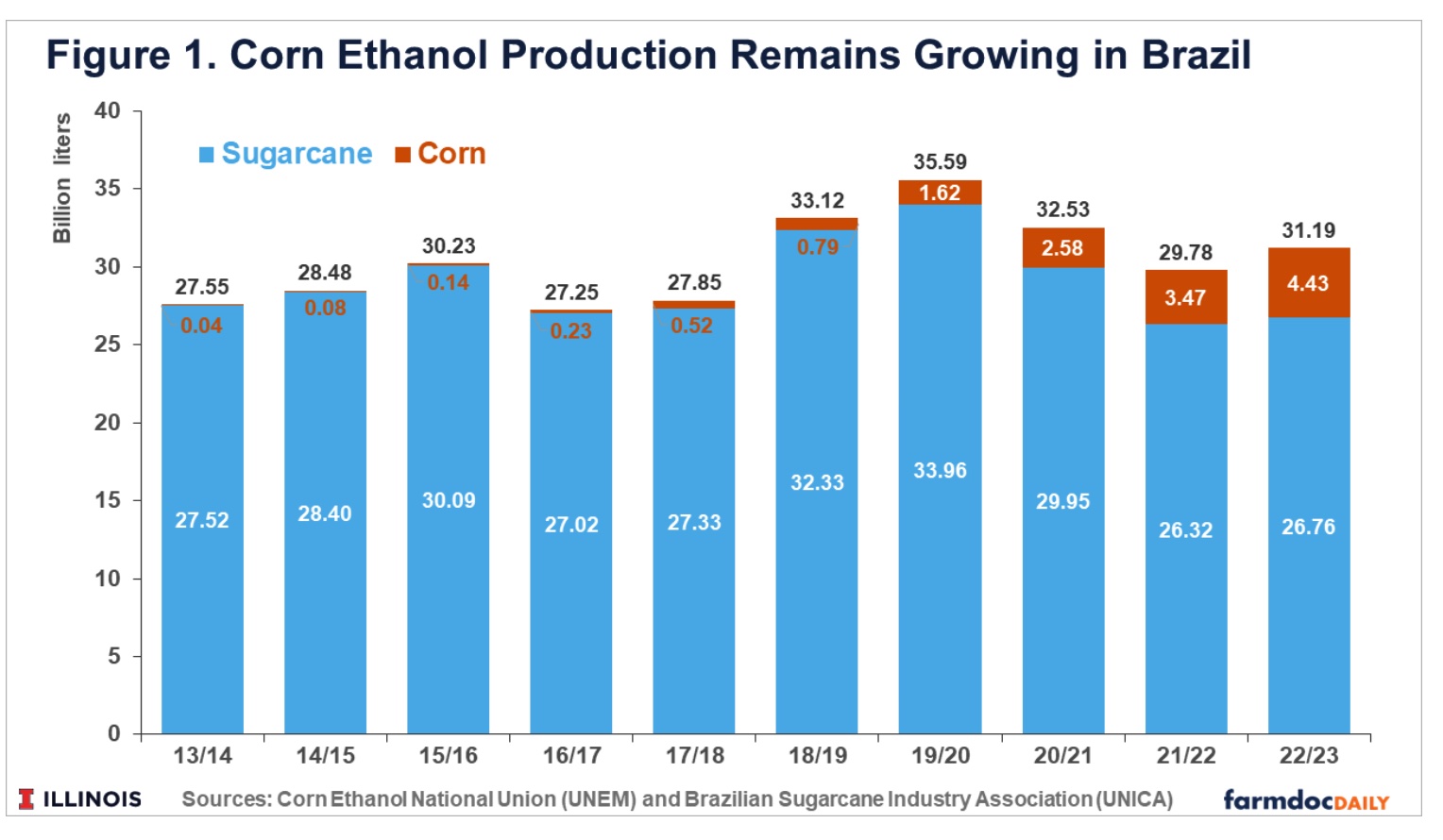
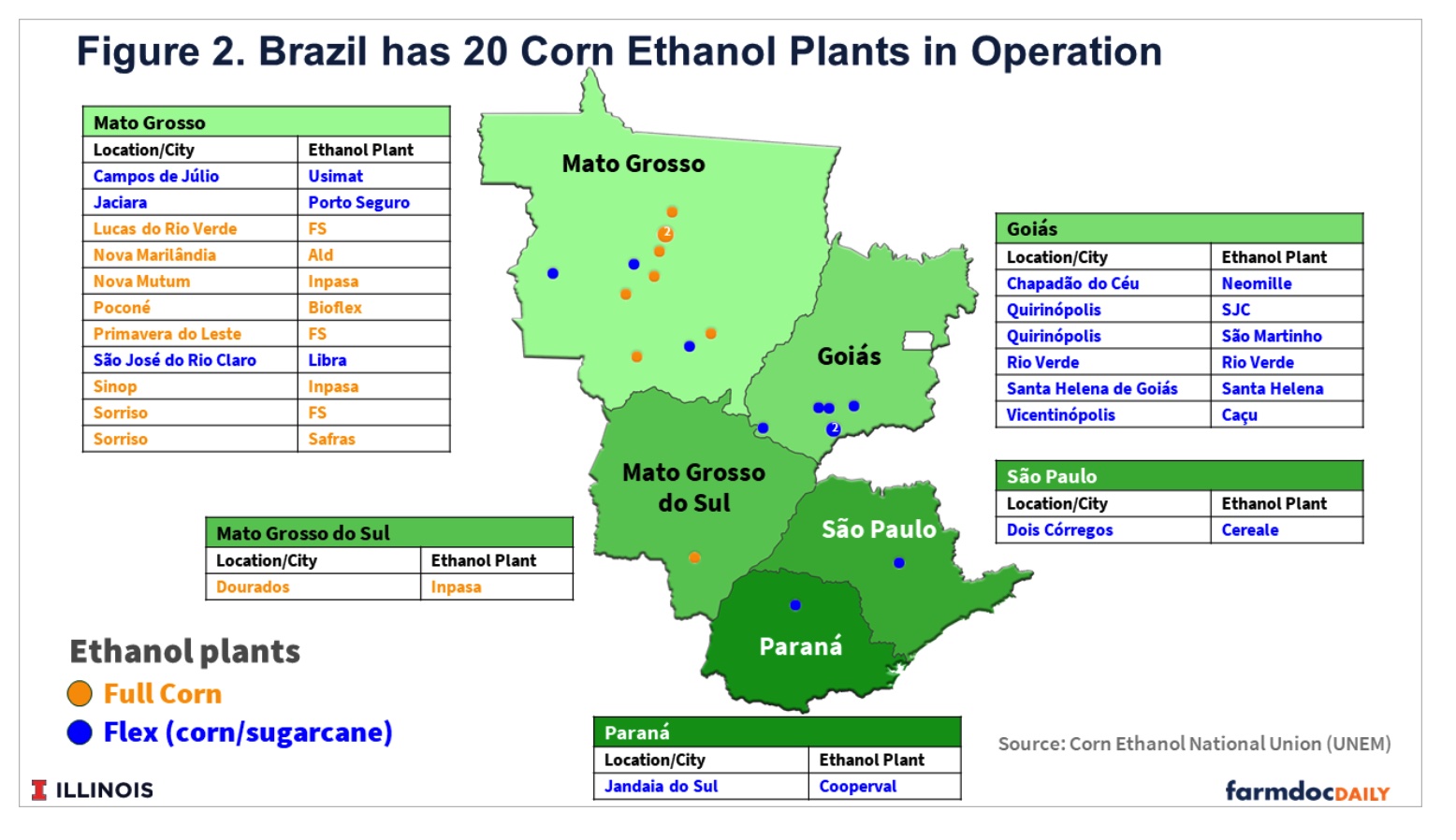
• U.S. drought threatens to prop up food inflation. Food costs were finally starting to show signs of easing after the pandemic and Russia’s invasion of Ukraine sent prices skyrocketing. Now, a drought across America’s breadbasket is a threat to further relief. Link to more via the Wall Street Journal.

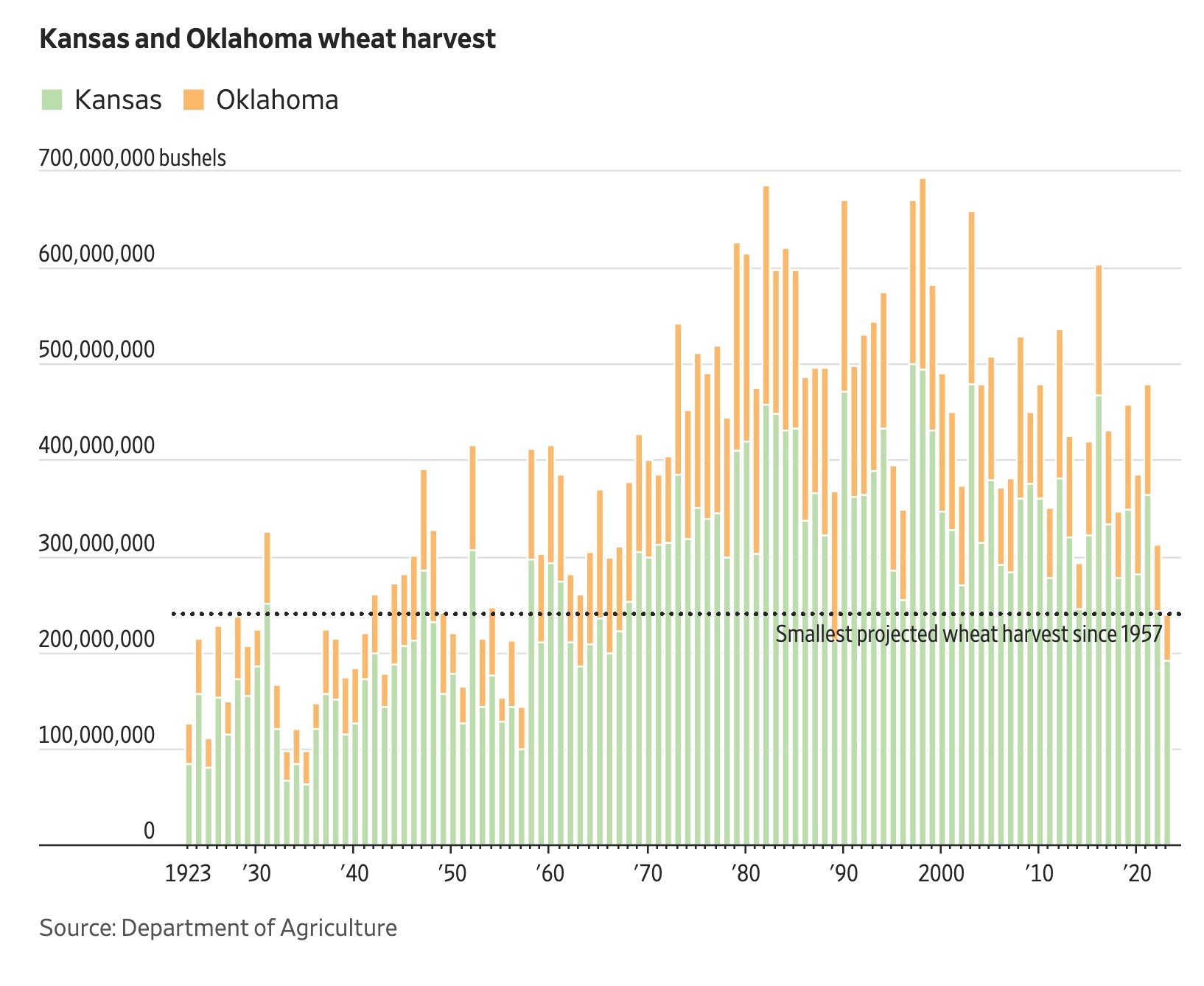
• Grain carloads hauled by U.S. railroads have been plummeting recently, including a 29% year-over-year decline in the week ending June 24, according to the Association of American Railroads.
• Argentina’s economy contracted 4.2% in April as one of the worst droughts in the country’s history pummeled agriculture exports. Link to more via Reuters.
• Ag trade: South Korea purchased 66,000 MT of corn expected to be sourced from South America or South Africa and bought 136,000 MT of optional origin corn but passed on another tender to buy up to 140,000 MT of optional origin corn. Algeria tendered to buy a nominal 50,000 MT of durum wheat.
• NWS weather outlook: Locally heavy rain and embedded thunderstorms over the lower Great Lakes/Ohio Valley today will taper off by July 4th but they will linger over New England... ...Excessive heat over California and Desert Southwest will become less intense as heat intensifies over the Pacific Northwest... ...Brief heat wave over the northern Plains will be ended by a period of showers and possibly strong thunderstorms followed by rapid cool down.
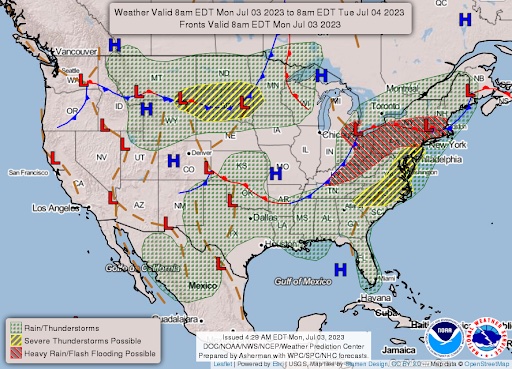
Items in Pro Farmer's First Thing Today include:
• Soybeans extend price surge overnight
• Central U.S. weather improving
• Record May soybean crush expected
• Cattle futures expected to open mostly firmer
• Hog futures expected to trade mixed
|
RUSSIA/UKRAINE |
— Ukrainian forces claimed to have recaptured some territory from Russia along eastern and southern fronts. The deputy defense minister, Hanna Mailar, said Ukrainian troops are advancing with “partial success” towards Bakhmut, a town captured by Russia in a bloody months-long push. Russia, however, claimed to have successfully repelled several attacks near Bakhmut and farther south over the weekend.
— The European Union (EU) is contemplating a strategy that could potentially permit the sanctioned Russian Agricultural Bank to establish a subsidiary focused on managing payments for grain exports, according to a report by the Financial Times. The aim is to ensure that the Black Sea Grain Initiative continues beyond its expiry date of July 18.
Russian officials have repeatedly expressed skepticism about the value of maintaining this deal, as they claim the proposed benefits to bolster Russian food and fertilizer exports haven’t actualized. Under the proposed plan, the new subsidiary would have access to the SWIFT payment system, facilitating grain export transactions.
EU officials discussed this contingency plan last week in Brussels in their pursuit of convincing Moscow to prolong the deal — the effort is aimed at keeping the Black Sea Grain Initiative operating past July 18 when it is to expire. The report portrayed this solution as being "the least worst option" to prevent the expiration of the deal. However, the plan's legal and practical feasibility is still under evaluation.
|
CHINA UPDATE |
— U.S. counterintelligence officials are heightening their alerts to American business executives regarding the increased risks associated with conducting business in China. This is a result of a recently revised Chinese law aimed at combating espionage. A warning was detailed in a bulletin by the National Counterintelligence and Security Center on Friday.
The concerns stem from ambiguities within the updated law, which are significantly vague regarding what counts as espionage. It could potentially criminalize activities generally considered normal in business operations. Furthermore, the modified law grants the Chinese government extended access to and control over the data from companies, heightening the risk.
Introduced as a counterespionage measure, the revised law takes effect on Saturday and has been a source of unease among foreign businesses operating in China.
— China's state planning agency has issued a warning regarding declining hog prices, stating that they have now fallen into a critical "warning zone.” In response, the agency has outlined plans for a second round of pork purchases for state reserves this year. According to a report by Reuters, the agency is also set to keep a close eye on hog prices, while continuing efforts to control both hog production capacity and prices. This approach is aimed at maintaining stability in a crucial sector of China's domestic economy.
|
POLITICS & ELECTIONS |
— Brazil’s electoral court barred former President Jair Bolsonaro from seeking office until 2030, finding that he undermined confidence in the country’s voting system months before losing last year’s presidential election.
— Political strategists warn No Labels candidate could tip presidential race to Trump. The Wall Street Journal reports (link) that the centrist group No Labels is preparing to run an independent candidate if the 2024 presidential race turns into a rematch between President Biden and former President Donald Trump. But while the group says Trump is too dangerous to return to the White House, political strategists warn that its independent candidate could ensure no candidate secures 270 electoral votes. That would let state delegation in the House pick the winner, which would likely favor Trump.
— The battle for control of the Senate has heated up, with five seats expected to be closely contested in the 2024 elections, according to The Hill (link). These include:
- West Virginia: Democratic Senator Joe Manchin faces a considerable challenge in securing a third term in the Senate from Republican West Virginia Governor Jim Justice, who leads by over 20 percentage points as per a late May East Carolina University poll.
- Montana: Retired Navy SEAL and businessman Tim Sheehy has entered the race, providing Republicans a promising candidate to potentially unseat Democrat Senator Jon Tester. Sheehy must first win against Republican Matt Rosendale in the primary.
- Ohio: Republicans consider Senator Sherrod Brown's seat critical. Despite being a strong Democratic incumbent, Ohio's increasingly conservative voter base might threaten Brown's bid for re-election. State Senator Matt Dolan, Bernie Moreno, and potentially Ohio Secretary of State Frank LaRose are prospective Republican candidates for the seat.
- Arizona: Democratic Representative Ruben Gallego, who continues to fundraise and gain endorsements, remains the primary Democratic contender, while Kari Lake is a strong potential Republican candidate. Independent Senator Kyrsten Sinema's decision to seek re-election as an independent remains uncertain.
- Wisconsin: Democratic Senator Tammy Baldwin, a successful incumbent, seeks her third term. Republicans, with Representative Mike Gallagher opting for the House, are considering self-funders Eric Hovde and Scott Mayer as potential candidates. External factors like President Biden's standing and the GOP Presidential candidate could influence the Senate race.
|
CONGRESS |
— House Republican leaders face a significant challenge in trying to pass government spending bills as their party, particularly the hard-right factions, have a history of opposing federal spending. A New York Times analysis (link) revealed that GOP House members have supported spending bills less than 50% of the time over the past dozen years. House Speaker Kevin McCarthy is now considering tailoring spending bills to align with these lawmakers' demands, potentially causing conflict with the Democrat-led Senate.
Members of the Freedom Caucus, known for advocating severe spending cuts, protested against the debt-limit deal last month, which resulted in McCarthy considering deeper budget reductions. This could lead to further complications and possible government shutdown this fall.
With a slim majority and no support from Democrats, the opposition from conservative Republicans will make passing any bill very challenging for McCarthy. Moreover, any approved bills might not pass the Senate, increasing the chances of an impending government shutdown and automatic spending cuts in 2025.
Diverse objections to spending bills stem from both procedural and ideological grounds; lawmakers oppose voting on an all-in-one funding bill and criticize the federal government for being excessively large and biased against conservatives.
In contrast, the Senate is functioning differently due to a smaller hard-right faction. The Republican and Democrat leaders in the Senate's Appropriations Committee hope to advance spending bills in a bipartisan manner. This has drawn criticism from House conservatives, particularly regarding proposals to increase funding for the Pentagon.
Upshot: House Democrats warn that the Republicans' approach might lead to a government shutdown after Sept. 30, the fiscal year's end. The deadlock for federal funding could result in significant consequences, both legislatively and politically.
|
OTHER ITEMS OF NOTE |
— U.S. Supreme Court agreed to hear a case challenging the Securities and Exchange Commission's (SEC) use of its in-house tribunals to enforce securities laws, potentially altering the way these laws are implemented in the future. These internal SEC proceedings are conducted by administrative law judges who, despite being SEC employees, are expected to exercise impartial judicial powers.
This comes as a response to an appeal by the Biden administration regarding a lower-court ruling from May 2022. The ruling had held that it was unconstitutional for the SEC to pursue enforcement actions and seek financial penalties through these in-house courts. Depending on the Supreme Court's final decision, the SEC's use of internal tribunals might be curtailed.
|
KEY LINKS |
WASDE | Crop Production | USDA weekly reports | Crop Progress | Food prices | Farm income | Export Sales weekly | ERP dashboard | California phase-out of gas-powered vehicles | RFS | IRA: Biofuels | IRA: Ag | Student loan forgiveness | Russia/Ukraine war, lessons learned | Russia/Ukraine war timeline | Election predictions: Split-ticket | Congress to-do list | SCOTUS on WOTUS | SCOTUS on Prop 12 pork | New farm bill primer | China outlook | Omnibus spending package | Gov’t payments to farmers by program | Farmer working capital | USDA ag outlook forum | Debt-limit/budget package |






